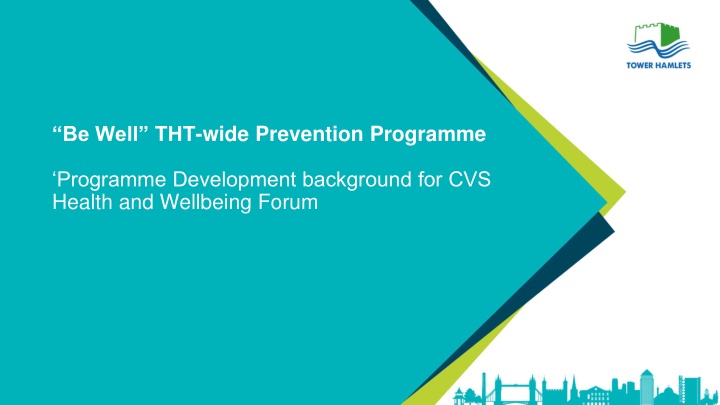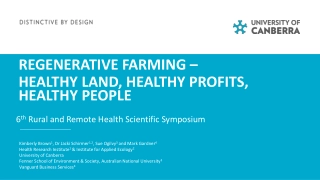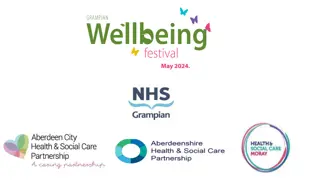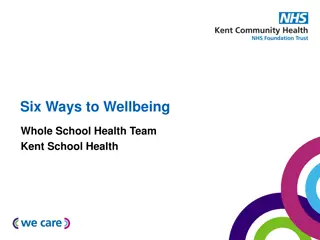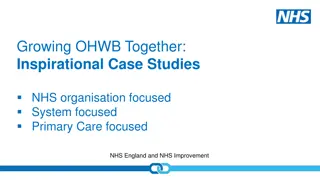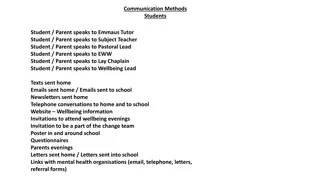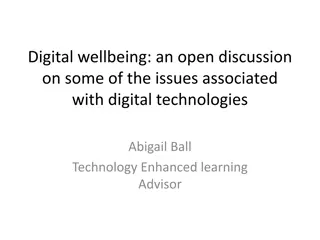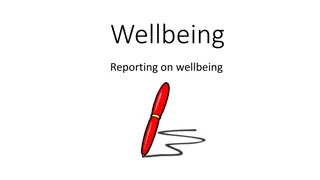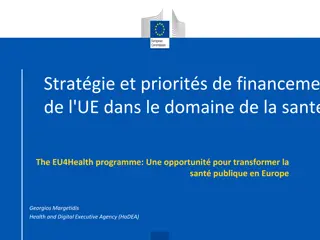Be Well Programme Development for Health and Wellbeing
This proposal outlines the Be Well THT-wide Prevention Programme aiming to address poor health and promote good health among Tower Hamlets residents. By focusing on modifiable risk factors such as smoking, obesity, unhealthy diet, physical inactivity, and high blood pressure, the programme seeks to reduce health inequalities and prevent unsustainable pressure on the healthcare system. Additionally, it targets common mental illness and harmful alcohol consumption to improve overall community health outcomes.
Download Presentation

Please find below an Image/Link to download the presentation.
The content on the website is provided AS IS for your information and personal use only. It may not be sold, licensed, or shared on other websites without obtaining consent from the author.If you encounter any issues during the download, it is possible that the publisher has removed the file from their server.
You are allowed to download the files provided on this website for personal or commercial use, subject to the condition that they are used lawfully. All files are the property of their respective owners.
The content on the website is provided AS IS for your information and personal use only. It may not be sold, licensed, or shared on other websites without obtaining consent from the author.
E N D
Presentation Transcript
Be Well THT-wide Prevention Programme Programme Development background for CVS Health and Wellbeing Forum
This presentation outlines a proposal for a THT- wide Programme on prevention: Be Well Several of THT s agreed Objectives, Outcomes, and one of the Priorities for Action, relate to Prevention of poor health, and promotion of good health. Prevention underpins many of THT s other Outcomes and Priorities, which will only be possible if we go upstream and prevent poor health early. Enabling our residents to live in better health requires system-wide action on the causes of poor health. The proposal is to establish a THT-wide Prevention programme, Be Well , to tackle poor health and enable our residents to live healthy, happy lives.
Poor health affects our residents unfairly, and causes unsustainable pressure on the health and care system. Tower Hamlets has high numbers of residents living in poor health. The gap in life expectancy between most and least deprived parts of our community grew in the latest year for which data are available (2020-21). Life expectancy has stopped increasing, and may have fallen slightly, for our most deprived residents. Our deprived residents, and women, live unusually long amounts of their life in poor health. Poor health in large parts of the population is a major cause of strain on the health and care system Large amount of pressure from people living with long-term conditions. High rates of multi-morbidity. Our population is ageing and becoming more unwell this will cause unsustainable system pressures unless we act to prevent this.
Be Well would focus on five modifiable risk factors (rather than conditions) that underpin a large amount of health inequalities Smoking rates at 11.7% are similar to London, but rates in BAME and routine/manual workers (34.2%) worse than London. 30,000 residents smoke Five modifiable risk factors the Vital 5 explain a large proportion of poor health in our population. Improving the population prevalence of these risk factors would improve health of our residents and reduce inequalities. 48% of adults are overweight or obese, similar to London despite young population. Rates of healthy diet (5-a-day) and of physical inactivity are worse than London. 118,000 residents are overweight or obese Tower Hamlets sees high prevalence of all of these modifiable risk factors, and unequal distribution leading to health inequalities. High Blood Pressure: hypertension diagnosis gap 8.1% is similar to London/England. % of GP patients with a BP recording has fallen since 2014, now lower than national average 20,000 residents have undiagnosed Hypterension These risk factors are shaped and patterned by the socioeconomic determinants of health. Addressing these risk factors, and the socioeconomic factors that underpin them, is therefore a priority for preventing ill health, and thus preventing health system pressures. Be Well will focus on preventing and reducing prevalence of these risk factors. Mental health - estimated prevalence of Common Mental Illness 22.8% worse than England. 50,000 residents have diagnosed CMI The Vital 5 is an evidence-based model developed by Kings Health Partners (kingshealthpartners.org) Overall admission rates for alcohol are better than England but rates among White British are higher. 55,000 residents drink at harmful levels
Be Well will take a system-wide approach to reducing the Vital 5, with action grouped around four pillars Outcome: Tower Hamlets socioeconomic environment makes it easier to live healthy lives; Residents are given the right support to improve factors like housing, employment, income Strengthening building blocks for health Pillar may include: action to improve physical, economic, food and social environments to promote healthy lives; action to link patients to appropriate support around wider determinants like housing, benefits, employment support etc. Outcome: Communities in Tower Hamlets are empowered and enabled to take action to improve our health, and health systems link to community assets Community-centered prevention and health promotion Pillar may include: initiatives to strengthen communities ability to promote health, such as Communities Keeping Well strengthening links to community assets including via social prescribing, TH Connect etc. developing volunteers and community champions to promote health Detection and enabling self-care Outcome: Individuals at increased risk are identified, and enabled to reduce their risk Pillar may include: initiatives, outreach etc to detect/identify individuals with heightened risks from Vital 5, and make residents aware of risk factors strengthening and aligning our support offer to enable self-care, and pathways to access this support Outcome: Systems and pathways of care are effective for proactively meeting residents needs and reducing risk Active Management Pillar may include: secondary prevention and management of the outcomes of detection and reduction of Vital 5 within clinical care pathways.
In order to deliver this programme, a number of enablers will be required Data and Outcomes: a shared outcomes framework across the four Pillars of the programme, to focus the work of the system and enable us to adjust and deliver impact. Community co-production: ensuring that our residents voice and insights shape any initiatives to produce this service. Communications: to ensure engagement of stakeholders throughout the THT system and beyond. Evidence-base and evidence building: linking with our HDRC and wider infrastructure to ensure a solid evidence base for our approach, and that research opportunities are maximised. These enablers will require appropriate resourcing.
Be Well programme overall logic model Long-term outcome Reduced health inequalities, and reduced pressures on health and care system due to poor health Medium- term outcome Building resilience and self-care to prevent and manage long term conditions (THT Objective) Immediate outcome Reduction of levels of Vital 5 risk factors, among most deprived and vulnerable residents Tower Hamlets socioeconomic environment makes it easier to live healthy lives; Residents are given the right support to improve factors like housing, employment, income Strengthening building blocks for health Communities in Tower Hamlets are empowered and enabled to take action to improve our health; Health systems link to community assets Outputs from activities Individuals at increased risk are identified, and enabled to reduce their risk Systems and pathways of care are effective for proactively meeting residents needs and reducing risk Community-centered prevention and health promotion Detection and enabling self care Activities: 4 pillars Active Management Enablers / inputs Data and Outcomes Evidence base and evidence-building Communications Co-production and resident involvement
The programme interfaces with several other work areas, and success will depend on defining a clear scope Interfaces / dependencies In scope Out of scope Initiatives that can support in reducing the level of Vital 5 modifiable risk factors across LBTH Wider initiatives to improve the healthiness of Tower Hamlets environments: this programme will focus on linking support around wider determinants with health and care services, and on specific most relevant environmental issues (food, physical activity). Localities and Neighbourhoods programme: many of the outputs such as INTs and Neighbourhood Forums, will be Enablers to the Be Well prevention programme The four pillars of the programmes, with their proposed outcomes, determine the scope of the programme LBTH Leisure insourcing programme: a Be Well brand has been developed that can be utilised for this programme Wider health promotion initiatives focused beyond the Vital 5 (e.g. uptake of screening, imms, etc) Ongoing programmes of work from Public Health, ICB, wider THT Partners Children and Young People will not be explicitly a focus there are already initiatives such as the Family Hub programme to support health promotion in this group. However the programme will support CYP by virtue of enabling parents to be healthier. Agreement and buy-in from across THT including primary care, secondary care, ICB, LBTH.
We are at early stages of programme development, and beginning stakeholder engagement to co- produce Wider Stake- holder engage- ment Consultation and THT Board deep dive to finalise Programme development Workshop - May Detailed program proposal / PID Delivery, oversight via Living Well Living Well, THT, OMG Annual progress reviews
Questions for HWB Forum Health and Wellbeing Forum is invited to: 1. Comment on the scope and outline structure of the proposed Be Well programme, as set out above 2. Suggest Outcomes, and Success Metrics, that could be used to successfully define the programme. 3. Suggest specific commitments that they/ their organisation can make as part of this programme and bringing those commitments to the workshop. This may require discussion within organisations in advance of the workshop 4. Consider additional suggestions for specific actions that could be taken in partnership to help achieving the aims of the programme. Should you have any questions please contact liam.Crosby@towerhamlets.gov.uk or zakia.Variava@towerhamlets.gov.uk
